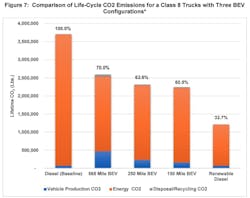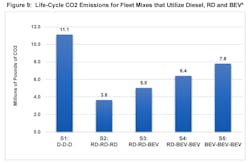ATRI suggest renewable diesel reduces emissions better than BEVs
With the launch of the EPA's $1 billion 2024 Clean Heavy-Duty Vehicles Grant Program, as well as more guidance on GHG Phase 3 final rules, it appears the time for widespread commercial battery-electric vehicle adoption is close at hand. But BEVs aren't the only path to decarbonization for the trucking industry. New research shows they might not even be the most effective path—renewable diesel could be far better.
A new report from the American Transportation Research Institute finds that, for the trucking industry, renewable diesel (RD) can outperform BEVs in vehicle costs, infrastructure costs, and even environmental impact. Called the Renewable Diesel—A Catalyst for Decarbonization report, it claims adopting BEVs to reduce emissions is nearly six times more expensive than RD. While electric infrastructure and vehicle purchase costs over 15 years could total $1.19 trillion, sufficient RD subsidies to lower emissions could cost less than a fifth of that, or $203 billion.
“This is a big difference,” Jeffrey Short, VP of ATRI, told [Fleet Maintenance affiliate] FleetOwner. “It’s nearly six times more expensive to get the same outcome as far as CO2—and we haven’t even really gotten to the fact that, operationally, the battery electric vehicles to do the long-haul job don’t even exist today. Our scenario assumes that they will exist, but they do not currently, and that is of great concern.”
ATRI’s report on RD builds off of the institute’s previous research on alternative fuels.
In May 2022, ATRI-published research found that, compared to traditional diesel-fueled trucks, BEV trucks could reduce CO2 emissions by 30.0%, while using renewable diesel in existing Class 8 trucks could reduce emissions by 67.3%. In December 2022, an ATRI study identified the energy infrastructure, charging infrastructure, and materials costs of a BEV truck transition.
The latest April 2024 study expands on this base, examining the overall benefits of RD compared to traditional diesel and BEV trucks.
“What we did in the report was take a further dive into renewable diesel versus battery electric vehicles as a pathway to decarbonize the industry, particularly with a focus on long haul,” Short said.
The study provided three analyses for this comparison. The authors looked at environmental benefits, operational capabilities, and financial viability of both RD and BEV adoption.
BEVs have higher CO2 emissions
The report found that regulations that mandate BEV trucks could actually result in higher overall CO2 emissions than programs that foster RD adoption.
See also: Trucking industry reacts to GHG3 rule pushing zero-emission adoption
To illustrate this, the authors showed a series of scenarios for a fleet of three trucks, comparing the life-cycle CO2 emissions among petroleum diesel, renewable diesel, and BEV adoption. A fleet of all petroleum diesel had estimated emissions of around 11.1 million pounds of CO2. A fleet using all renewable diesel, on the other hand, had estimated life-cycle CO2 emissions of around 3.6 million pounds. Finally, a fleet of all BEVs would increase CO2 emissions to roughly 7.8 million pounds.
“Each battery electric vehicle is increasing the carbon footprint of this fleet,” Short said. “Effectively, mandates that would move to battery electric from fleets that are already using renewable diesel essentially makes things worse from a carbon perspective.”
Renewable diesel could be cheaper to adopt
The research team also compared the costs of BEV adoption versus RD.
Comparing these costs required multiple layers of possible future scenarios. The team gauged the scale of both decarbonization methods by estimating the lifetime CO2 emissions of vehicles in future truck populations.
In the BEV scenario, 61.5% of the 3.25 million trucks in operation would be battery-electric in 2038, with the remaining 38.5% still using petroleum diesel. The total emissions in this scenario would be roughly 9.82 trillion pounds of CO2—roughly 22.6% fewer emissions than a truck population of entirely petroleum diesel trucks.
To match this CO2 emissions reduction, the study found that only 28.35% of trucks must run exclusively on RD. With the remaining 71.65% of trucks using entirely petroleum diesel, the total emissions would reach only 9.74 trillion. If RD consumption grew by 15.79% annually from 2023, the U.S. could meet this emissions reduction by 2030.
What is renewable diesel?
Renewable diesel is a type of biofuel commonly used in the trucking industry. It is made by treating fats and oils from plants, animals, and waste streams with high pressure and heat to create a chemically identical fuel to petroleum diesel. Renewable diesel can be mixed in with petroleum diesel or entirely replace it in a diesel-powered truck without modifying the vehicle.
Compared to traditional diesel, renewable diesel can cut the lifecycle greenhouse gas emissions of truck fueling by up to 85%, according to the State of Oregon Department of Environmental Quality.
This article origially appeared on FleetOwner.com.
About the Author
Jeremy Wolfe
Editor
Editor Jeremy Wolfe joined the FleetOwner team in February 2024. He graduated from the University of Wisconsin-Stevens Point with majors in English and Philosophy. He previously served as Editor for Endeavor Business Media's Water Group publications.



